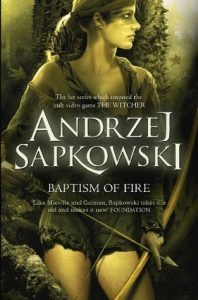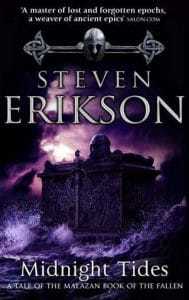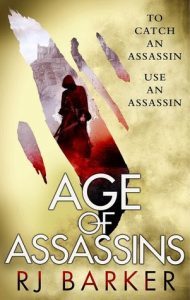Adrian Collins's Blog, page 231
September 21, 2019
REVIEW: Royal Assassin by Robin Hobb
Minor spoilers may follow. After being poisoned in the Mountain Kingdom towards the end of Assassin’s Apprentice, Fitz is a broken and crippled shell of his former self. In Royal Assassin he swears to himself that he will no longer be one of King Shrewd’s men and will not return to Buckeep. The day before Burrich and Hands are set to venture back to the capital Fitz has a sort of fever dream. Without him truly understanding he finds himself Skilling and resurfaces in the King’s body as he is talking to the Fool. He is made aware of an illness that ails the King and that all is not well in Buckeep at all. After this confusing but eye-opening exchange Fitz changes his mind and sets off with his comrades the following morning. The Red Ship armies and their forged soldiers are attacking settlements continuously and are getting scarily close to, as if somehow they are being drawn to, the capital city. It also soon becomes clear that Prince Regal has malignant ambitions and potential political turmoil is just around the corner.
“Are you sure you’ve not had a bad dream?”
“If I have, it’s lasted most of my life.”
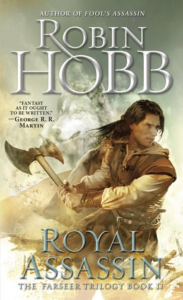 To say that it took me four attempts to read and complete Assassin’s Apprentice I had no such gripes with Royal Assassin. I raced through the 648 pages in under 4 days and loved every second. I fell back into the mind of FitzChivalry effortlessly. Hobb’s characters are phenomenally well-crafted and the way that she’s able to arouse my heart, my tears, and also my utter hatred of certain players is masterful. The way she makes me despise Prince Regal is as if he were personally treating me the way that he does “the bastard.” My favourites to read about were the honourable King-in-Waiting Prince Verity, Assassin Master Chade, the eccentric and art-loving Lady Patience, and the warrior-like but often isolated Queen-in-Waiting Kettricken.
To say that it took me four attempts to read and complete Assassin’s Apprentice I had no such gripes with Royal Assassin. I raced through the 648 pages in under 4 days and loved every second. I fell back into the mind of FitzChivalry effortlessly. Hobb’s characters are phenomenally well-crafted and the way that she’s able to arouse my heart, my tears, and also my utter hatred of certain players is masterful. The way she makes me despise Prince Regal is as if he were personally treating me the way that he does “the bastard.” My favourites to read about were the honourable King-in-Waiting Prince Verity, Assassin Master Chade, the eccentric and art-loving Lady Patience, and the warrior-like but often isolated Queen-in-Waiting Kettricken.
“Sometimes,” Chade observed, “it would be much easier to die for one’s king than to give one’s life to him.”
My absolute favourite scenes throughout the narrative are when Fitz converses with a wolf that he rescued from captivity, Nighteyes. We find out a lot more about the magic certain people can wield in this entry, especially The Wit (known impassionately to most as beast-magic), showcasing what Fitz and his companion can do together to help each other. Fitz uses Nighteyes senses sometimes, Nighteyes makes him aware when someone is following him, and likewise, Fitz helps his wolf hunt when he has wolf dreams. The Skill is also explained and utilised more frequently in Royal Assassin especially when Verity can speak to and follow the actions of Fitz when Fitz is fighting the raiders and vice-versa when Verity travels to the Rain Wilds in search of the Elderlings.
Although it does include some stunning action segments, a lot of Royal Assassin is about the quieter times, the thoughts and conversations characters share, beautifully massaging every word, statement, motive, agenda into our mind so then the action scenes hit much harder as we completely understand the consequences from all angles. An average day for Fitz would be a conversation with Burrich, with Patience, meeting the Fool, keeping Kettricken company, talking to Nighteyes, conversing with Verity, being summoned by the King, insulted by Regal, still infatuated with Molly and then meeting Chade is the assassin’s hidden abode. It doesn’t sound the most exciting when spelled out like that but I was hanging on every word and adored the entire reading experience.
Assassin’s Apprentice followed Fitz over 10 years of his early existence. This narrative takes place over much less time. Perhaps a year or two. Fitz is a brilliant protagonist, extremely intelligent and he always knows much more about what is happening than anybody else can acknowledge, apart from Chade, but even from him, Fitz keeps a few secrets. We share Fitz’s highs, lows, dreams, dramas and even his utter lucid, revenge-inspired madness at one point.
The last 100 or so pages are absolutely phenomenal. Due to the incidents taking place I was gripping my book with such intensity that I thought I was going to rip it in half. Eyes glued to the page, every word attacking a plethora of my emotions. Royal Assassin is an engaging and intense character-focused political fantasy masterclass. I’ll be reading Assassin’s Quest as soon as I can and if things continue this way then Hobb might have written what could become one of my top 3 fantasy series of all time.
Buy Royal Assassin
The post REVIEW: Royal Assassin by Robin Hobb appeared first on Grimdark Magazine.
September 19, 2019
REVIEW: Dark Forge by Miles Cameron
Miles Cameron continues to go from strength to strength in his fantastic novel Dark Forge. Immense world-building, unique characters and bloody action that has a realism and authentic grit that is rare for fantasy books. Book 2 of Masters and Mages, Dark Forge is fantastic. Read it!
There is always time to talk. You must not be in such a rush to die, my brother.
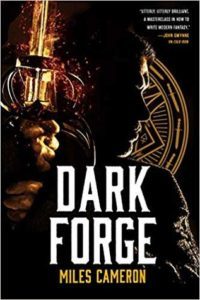 Dark Forge does not feel like the 2nd book of a trilogy. It is not a filler, and although it sets up book 3 fantastically, it also stands tall alongside Cold Iron. For those that have read book 1, Cold Iron, the second instalment is a surprising and very different read. Where in Cold Iron, Cameron had calm world-building, growing and several brilliant but small set-pieces, Dark Forge has great battles, sieges, and a massive step up on the magic side.
Dark Forge does not feel like the 2nd book of a trilogy. It is not a filler, and although it sets up book 3 fantastically, it also stands tall alongside Cold Iron. For those that have read book 1, Cold Iron, the second instalment is a surprising and very different read. Where in Cold Iron, Cameron had calm world-building, growing and several brilliant but small set-pieces, Dark Forge has great battles, sieges, and a massive step up on the magic side.
She handed him a bowl of fish stew. “Horses like it.”
This seems to represent her highest level of compliment.
It kicks off with a chapter from a new character, someone on the ‘dark side’. Val-al-Dun’s story here brings about the intense and cataclysmic events that change Aranthur’s life. It switches then, to a great battle, continuing from where Cold Iron finished, which brings about the familiar and accomplished battles that Miles Cameron is renowned for. (Cameron takes a lot of inspiration from his re-enactment, writing battle scenes from experience. Don’t be too worried though, I don’t think he’s ever actually killed someone with a sword. Or has he?) Aranthur and his comrades must use their skills and will to defeat the ‘Pure’, magic snobs who believe it belongs to the nobles, rather than the common.
Aranthur, our main PoV, is a young man who we have grown to love throughout Cold Iron. His journey started excellently, showing his traits as being a special individual, from humble beginnings but seeking a life in the Big City that his family had warned him of. His awareness throughout Cold Iron of the character he could become through his sword-craft, university studies, magic-practising and woman chasing explored his ‘normal-ness’. (I sometimes realise that I wish I was Aranthur…) He is a real, believable character, and his arc through Dark Forge took him to places that I did not expect, and places he definitely did not expect.
This is a meeting of Cold Iron.
The list of secondary-characters grows throughout Dark Forge, as Aranthur and his comrades move their way from the city to pursue a journey across countries. Aranthur’s responsibility grows gradually as he is promoted, and he takes leadership roles sometimes from his role within the army, and other times because he is Aranthur, and he is what ties his band together. Dahlia is as fantastic as ever, I constantly found myself wanting to read more between her and Aranthur. Other notable characters are Inoques and General Tribane, brilliant female characters. Each character adds to the Eastern and refreshing world, making me want to read more fantasy in Eastern settings.
“Traitor!”
“Traitor to what?” Aranthur shot back. “An Empire whose nobles endlessly place self-interest before even simple patriotism?”
5/5 – yet another masterclass from Cameron, superb world-building, enjoyable characters, a realistic plot and story (as realistic as magic and fantasy can get), and the familiar brutal and bone-shattering battle scenes and duels. Dark Forge propels Aranthur into a world of trouble, and I can’t wait for the final instalment, Bright Steel.
Buy Dark Forge
The post REVIEW: Dark Forge by Miles Cameron appeared first on Grimdark Magazine.
September 16, 2019
Master of Sorrows: The Lost Chapters – Devils Bargains
Chapter 24.5 is an interesting one, not just because it didn’t make it into the final book, but also because it reveals so much more about the wood-witch (Kelga) and the Shadow Reborn (Oyru). It hints at how their two magics work and gives the reader a lot more of the grimdark/horror elements that aren’t as apparent in Book 1, but which become more stark as the series progresses. It also gives a preview of the golden Mask of Gevul’s Mistress (which appears at the end of Master of Sorrows and which plays a significant part in Book 2).
Now, as to why it wasn’t included in the final book, there are two very good reasons:
(1) Most of Master of Sorrows takes place from the perspective of the protagonist (Annev de Breth), and Chapter 24.5 is essentially a POV shift. I cheat a bit by having Annev act as a “floating eye” in which he dreams about the events taking place, but it’s still not something he experiences directly. Given all that, it didn’t make much sense to include it, especially since . . .
(2) Annev can’t remember the details of his dream when he wakes. So the reader would know about the dream, but Annev would not. That would be odd (to say the least) and implies that the chapter would be wholly unnecessary (just a tool for squeezing in more world-building, etc).
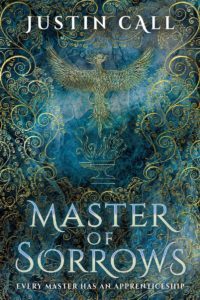 So, in the end, we cut the chapter. I didn’t throw it away, though, because these events are still canon. They happened but Annev didn’t experience them and/or he can’t remember them – but they still occurred within the context of Book 1, so it made sense to hang onto the chapter (if only for readers who later wanted a good short story that expanded on the background events that happened in Master of Sorrows).
So, in the end, we cut the chapter. I didn’t throw it away, though, because these events are still canon. They happened but Annev didn’t experience them and/or he can’t remember them – but they still occurred within the context of Book 1, so it made sense to hang onto the chapter (if only for readers who later wanted a good short story that expanded on the background events that happened in Master of Sorrows).
There is a second reason this chapter is worth keeping, though, and that is because this foreshadows Annev’s ability to enter the world of dreams. In this particular chapter, Annev “dream walks” and experiences a vision of actual events that are occurring while he is sleeping. He witnesses them as if he were actually there – as if he were one of the participants – and this is significant because he continues to develop this ability later in the series (first by dream walking and later through astral projection); as he gets better at this ability, he also gets better at remembering the details of his dreams and eventually interacting with the events he observes from afar. Also, since the World of Dreams borders the Shadowrealm (a place we see a lot more of in Book 2), it made sense to keep this scene for future readers. However, because of the aforementioned reasons, we decided it didn’t make sense to include it in Book 1. It’s definitely worth reading, though – especially if you read and enjoyed Master of Sorrows – because it sheds a whole new light on the events that later occur between Oyru, Kelga and Annev.
Enjoy.
MASTER OF SORROWS: THE LOST CHAPTERS
Chapter 24.5
DEVIL’S BARGAIN
Annev awoke as the woman in the gold mask pounded on his chest. The invisible wall that had constricted his lungs and rib cage disappeared and a burst of stale air erupted from his mouth. As fresh oxygen rushed to fill the vacuum, Annev coughed violently, expelling it back out. His eyes fluttered open and closed, trying to reconcile the blackness he saw with the blackness he had felt while unconscious; the stars were bright above him, yet few shined through the thick canopy shrouding the Brakewood.
Annev coughed again, his lungs rattling, then began to breathe in earnest. He rolled onto his stomach, struggling with disorientation as he huddled beneath his brown traveler’s cloak. His face hurt. His chest ached. Perhaps worst of all, though, was the pain in his left hand.
When he tried to stand, he stumbled and realised his wrists and ankles had been bound. Anxiety rising, Annev carefully probed the ground beneath him and found that he had been lying on a flat rock. His hands reached farther, finding the edge of the raised stone, and he discerned he was kneeling on a table of some sort. At the same time, he discovered the source of the pain in his left hand.
He was missing three of his fingers.
When a feminine voice spoke from somewhere nearby, Annev scrabbled atop the rock and searched for the speaker, but his eyes were still unable to pierce the abiding gloom.
‘He refuses to speak,’ the woman said, her voice dripping with malice. ‘If you would just let me— ’
‘No.’ The reply came a short distance away. ‘You have had your chance. The seer will divine what I need to know.’
The woman’s voice dripped with venom, but this second voice – a man’s voice – was devoid of all emotion. Cold. Apathetic. Empty.
Annev feared the first voice, but he was terrified of the second.
A second coughing spasm racked Annev’s body as he struggled to stand and see the two people speaking. Instead of rising from the ground, though, he fell off the stone table and landed with his face in the dirt.
I need to get up, Annev thought, his heart racing. I need to get out of here . . . to run! But his mind was sluggish, thick with fog, and his limbs were slow to respond to his commands. He searched his memories for any clue of who these people were or how he had gotten to the Brakewood, but the last thing he could remember was his frustrating conversation with Tosan.
A small but powerful hand grasped the base of Annev’s skull just as a second hand reached between his legs and lifted him off the ground. The darkness seemed to spin around him, and then he crashed back down onto the stone table. Moonlight broke through a gap in the canopy overhead just as a hand grabbed Annev’s thinning hair and pulled his head back, exposing his neck. A thin blade of metal appeared, pressing against his skin.
Oh, Gods.
His attacker leaned forward, her golden lips brushing Annev’s ear lobe. Out of the corner of his eye, he saw the woman’s features were hidden behind a delicate golden mask.
‘Lie still,’ the woman breathed behind the unmoving gilded lips. Her voice trembled slightly, as if in ecstasy or pain.
A dark form moved in the shadows to Annev’s right. He instinctively turned his head, trying to see what new menace threatened him, but the masked woman’s knife sliced into his skin. She yanked his head back, slamming it into the stone table, and he felt his body go limp.
A withered face approached the altar and peered into Annev’s eyes. In the dim light of the moon, he glimpsed crooked teeth and milky-white irises.
The old woman smacked her lips, her tongue slithering out to lap at her own saliva. She took the knife from the woman in the gold mask and cackled.
Before Annev could process what was happening, he felt a sharp pain slice through his abdomen. Warm blood flowed over his skin, soaking his shirt and pooling onto the table. An unnatural chill seeped into his chest and bowels, and then something seized his core, twisting his guts into an onslaught of agony.
Somewhere nearby, he heard a scream – a wail of pure and unabashed torment. Annev turned his head, confused, then realized the sound was coming from his own mouth. At almost the same time, the masked woman snatched something off the table and shoved it in his mouth, forcing him to clamp down on it. He gagged, tasting blood. The flesh yielded slightly beneath his teeth before meeting bone – and then he knew.
He was biting his own severed fingers.
Above him, the old woman lifted a flat, palm-sized rock. She turned the stone in her hands so that its face reflected the moonlight, revealing a flaky red smear on the surface of the rock. The sight of it stoked something in Annev’s memory, but his mind was so hazy with pain, he couldn’t fathom why the stone looked familiar.
The crone lifted the rock to her mouth and spat on its surface. Her pointed tongue snaked out, swirling in the saliva stained red by the crimson powder. She smacked her lips yet again, eyes closed, savoring. When she opened her eyes, the dots of the seer’s pupils glowed red.
The old woman set the rock down on the table and took back up the knife – a slender blade with a wicked curve nearly a span-and-a-half in length. Her other hand reached down, grasping at Annev’s stomach, and the twisting torment seized his gut once again. He screamed around his makeshift gag and tried to resist – to pull away from the witch and roll off the table – but the masked woman pinned his head and shoulders as if he were but a frail child.
The seer drew a handful of intestines up to her face and examined them closely. She prodded the bloody coils with her knife and spoke.
‘The Vessel is close . . . and closer still.’ She sniffed the entrails then hissed. ‘But he is hidden from my sight – from anyone’s sight.’
The woman holding Annev’s head growled beneath her gilded mask, but it was the chilling, unseen male who spoke.
‘How?’ The stranger’s voice was so flat, so void of emotion, it was barely a question.
‘A magic circle,’ the seer said, fondling the intestines. ‘Old magic . . . as old as the forest. Yet there is a path through the circle.’
She reached deeper into Annev’s guts, grasping at exposed organs, prodding them with the tip of her knife. The excruciating pain Annev had previously felt had now morphed into something less insistent. He unclenched his jaw and the severed fingers fell from his mouth. Slowly, he felt himself drift away from the pain, his consciousness seeming to rise out of his head and above his body.
‘An anointing,’ the witch said at last. ‘Or the help of a guide who has been anointed.’
‘A guide,’ the male voice said, almost sighing. ‘But this man is dead.’
Annev looked down at the hunched old woman, detached from all the sensations of his body. He watched in fascination as she looped more of his bowels around her fingers.
‘Yes,’ she said, pinching one of the coils between her thumb and forefinger, ‘but he lacks the anointing, so you have lost nothing.’ She slid her knife down the length of the intestine, examining its contents.
‘So how do I find the Vessel?’
‘When he leaves his circle of protection.’
‘When. Where. How will I know him.’
The old woman shook her head, dropping the entrails back into Annev’s gaping stomach. ‘I can only divine with the blood—’ She gestured haphazardly at the palm-sized stone lying beside the corpse. ‘—and a living augury. Once the spirit flees the body, the divination fails.’
With his consciousness floating above the altar, Annev instinctively pulled back from the macabre spectacle of his death. His perspective shifted, rising higher until he could see the entirety of his body. The masked woman stood at one end of the altar and finally released Annev’s head. The hunchbacked witch stood to the right of his corpse, her form cloaked in a cowled black robe, its surface spotted by blood and other darker stains.
Annev’s attention returned to the woman in the golden mask. There was something strange about her – stranger even than the blood-spattered witch; the woman who had pinned him had been short, less than five feet tall, with a tight bun of gold hair peeking out from the back of her metal mask. Her hands and feet were also bare, painted with a dull grey paint, and her limbs were wrapped in tight-fitting strips of black leather. Strangest of all, though, was the blue-black, semi-transparent material that covered the woman’s torso and loins: the substance looked almost like armor, yet it molded perfectly to the woman’s curves and crevices. The effect was disturbingly revealing and not a little erotic.
‘Is there enough blood for another augury?’
Annev tried to shift his perspective toward the unseen speaker, but he found it hard to focus on the stranger’s location; even with his new vantage point and the moonlight shining down on the altar, too much of the grove remained shrouded in darkness. Still, Annev had a general notion of where the speaker stood, so he focused his consciousness on that spot.
From the periphery of his disembodied perspective, Annev saw the witch pick up the flat stone and study its surface.
‘Just,’ the seer said, licking her lips.
‘Then you will tell me precisely when and how the Vessel will leave his circle.’
Something shifted in the darkness Annev was studying. It was faint – a singular shadow moving among other shadows – but its form was that of a man.
‘Bah.’ The old woman spat. ‘Kelga has done her part. I will take my body and—’ Just as the crone reached for Annev’s limp arm, a second blade appeared in the masked woman’s hand. The gilded woman dashed forward, reaching for the seer, but the hag blinked and suddenly she stood on the opposite side of the altar. She shook her head, cackling, and the masked woman hissed in response.
The spectre that Annev had been watching separated itself from the darkness, acquiring depth and dimension as it became corporeal. The shade stepped into the halo of moonlight surrounding the altar and Annev perceived that it did indeed possess the form of a man – tall, toned, and broad-chested – yet its details were obscured by ragged, dark grey robes and a black face wrap. The garment defined the limits of the man’s figure, yet it also blurred the edges of where his body ended and the darkness began.
‘You forget your place, Kelga,’ the shadow said, waving his hand at the altar.
A dozen black tentacles reached out from the darkness beneath the lip of the stone table. The adumbral appendages prodded the surface of the altar, searching for and then latching onto Annev’s limbs, loins, and torso. At the same time, a dark shadow seemed to pool out from beneath the corpse, swallowing the dark blood that had stained the stone’s surface.
The crone reached a hand toward Annev’s remains but before she could reach him, the tentacles constricted and pulled the disemboweled corpse down into the blackness covering the table, disappearing along with the ghostly grey tentacles.
The old woman snarled, ringing her bony hands. ‘We had a bargain, Shadowcaster! That corpse is mine by right.’
‘You have no rights,’ the shade whispered, his voice completely devoid of passion. ‘We had an agreement, and you have not fulfilled it to my satisfaction. Until then, you have no claim on the artisan’s body.’
Kelga titled her head, peering out from beneath the cowl of her robe. The woman’s fiery pupils had been extinguished, yet her milky-white orbs still reflected the moon’s ghostly light. She growled in frustration, held her breath, then cackled with glee.
‘The spell still requires a living augury,’ Kelga taunted.
‘A human sacrifice,’ the man-in-gray clarified, stepping up to the other side of the naked altar. ‘Any restrictions on race, age, or gender?’ As he spoke, tendrils of smoke wafted up from his fingers then solidified in the form of an iron-gray stiletto.
The crone snorted. ‘Breathing is the only requirement. Though I have found—’
The man-in-gray flicked out his arm and the masked woman at the head of the altar jerked in place. She looked down, staring dumbly at the thick metal spike piercing her blue-black armor, then she connected it with the man holding the stiletto’s handle. The petite woman screamed with the rage of pain and betrayal then raised the blade she had used to threaten the witch. In a flash, she stabbed her betrayer once, twice, thrice.
The stranger in the gray rags barely flinched. Inky smoke leaked from his wounds, but these quickly closed, with the injuries and even the rents in his garments healing in moments.
In response to the attack, the stranger released his hold on the buried dagger and used both hands to clap the woman on the sides of her neck, head, and abdomen. The masked female went limp, and the man-in-gray caught her before unceremoniously dropping her unconscious body atop the stone altar.
The witch grunted, poked at the blade protruding from the injured woman’s chest, and shook her head. ‘The girl will die before I finish the divination.’
‘No,’ the gray-garbed man said, waving a hand and causing the black stiletto to disappear in a vapor of smoke. Bright blood bubbled from the wound, but the man ignored it. Instead, he tapped on the injured woman’s golden mask and circled round the altar to stand behind her head. ‘The pain will sustain her. Begin your augury.’
Kelga sniffed at the command but took up her blood-stained stone all the same. Again, she drew her tongue over the rock’s surface, but this time she lapped at every crimson fleck remaining on the stone. When she was finished, the rock was clean, wet with her own saliva.
The crone brought her bloody dagger up and began to cut at the hole in the masked woman’s chest. Annev watched in fascination as the witch worked to peel back shards of the chitinous blue-black armor. From his disembodied perspective, the witch’s knife looked every bit as potent as the stiletto wielded by the man-in-gray, yet the masked woman’s armor resisted the old woman’s blade, fighting against its slender sharpness. After several minutes, the witch finally scraped off enough chitin that she could begin her grisly divination. She licked her lips, plunging both hands into the woman’s stomach and pulling out double handfuls of entrails.
Atop the table, the masked woman jerked, her unconscious body jolted awake by the pain of the crone’s augury. Before she could resist, though, the man in the fluttering gray robes gestured at the table and four pairs of long-fingered hands stretched out of the shadows. The dark gray limbs seized the woman on the table, pinning her arms and legs with demonic strength. The masked woman screamed in earnest then, fighting furiously at her unnatural bonds. She slipped free of one hand, but then six more of the shadow-spawn’s claw-tipped hands shot out of the dark, seizing the freed limb and holding the masked woman’s torso tight to the surface of the stone altar.
‘The Vessel will leave his circle before the end of Regaleus,’ Kelga said, undistracted by the masked woman’s thrashing. ‘You will know him by the mark of Keos that he bears.’
‘Regaleus has already begun,’ the man-in-gray said. ‘So he will leave tomorrow or the night after.’ The witch grunted in agreement. ‘Where?’
Kelga hesitated then twisted the intestines in her hand. Atop the altar, the masked woman screamed.
‘He walks two paths. Two roads that are too similar too disentangle.’ The crone hissed in frustration. ‘One leads east, the other north. But quaire, taints his course, pulling him toward rivers and the oceans.’
‘Northwest . . . and southeast.’ The witch nodded. ‘Where? I need a name. A place.’
‘I see . . . a small town. North of the Brake.’
‘Banok,’ the stranger supplied.
‘Perhaps. The other is . . . here. In the Brake itself.’
The man-in-gray paused then nodded. ‘Go on.’
‘On either path, the Vessel hunts a merchant who hoards items of power. On either path, the Vessel has been sent to claim a rod and bring it back to the protection of his circle.’ Kelga stopped, humming thoughtfully as she pulled loop after loop of entrails out of the dying woman. ‘Strange,’ she murmured. ‘He finishes his quest . . . with an unexpected talisman.’
‘Talisman,’ the stranger repeated. ‘What kind of talisman?’
The witch shook her head. ‘I see lumen and quaire, but both talismans are taken from the Vessel.’ As she spoke, the woman atop the table relaxed, no longer fighting against Kelga’s grisly divination.
‘What more can you tell me?’
The crone swore in some dark dialect Annev did not know then frantically tore through the abdomen of the dying woman. ‘Beasts of burden,’ she said after a moment studying. ‘Abandoned. Find them and the Vessel will find you.’
The woman on the table exhaled as her body finally went limp. Kelga spat and threw her fistful of entrails back into the woman’s chest cavity.
‘Darkness and death obscure further divination. I have seen all that fate will allow.’ The old woman wiped her bloody hands on her black robes and turned to the man-in-gray. ‘I have fulfilled our bargain. If you are satisfied, I will have my prize now.’
The man at the head of the altar reached down and plucked the golden mask off the face of the dead woman. Beneath the gilded metal Annev saw red lips, delicate ivory cheekbones and soft green eyes; she had been in her mid-twenties, beautiful and vibrant with the strength of youth. It seemed strange that Annev could have felt such hate and malice from such a demure and petite young woman. The golden mask she had worn had been no less beautiful than the face beneath, yet both had contrasted with the woman’s venomous words and ferocious demeanor.
The man-in-gray wrapped the mask within the folds of his tattered robes then flicked a wrist at the young woman’s corpse. The black hands constraining the dead woman greedily pulled at her, fighting to pull her corpse into the shadows. Flesh ripped and bones cracked, and then the woman’s torso and limbs separated, the darkness swallowing her blood, flesh and bone.
Once the corpse was gone, the darkness spread out again, pooling over the surface of the table as black tentacles emerged from the shadows, pushing the first corpse through the blackness and up onto the altar’s stone surface.
Kelga looked at the disemboweled body and nodded, cackling as she grasped the balding man’s brown cloak and then pulled his corpse off the table.
Annev stared, disoriented by the sight of the witch dragging the bloody corpse to the edge of the grove.
That’s not me, Annev realised. She didn’t kill me. She killed . . . that man. Memories of being killed by the witch warred with echoes of who the stranger really was. He recalled an unstrung bow . . . wet boots . . . a cup of tea.
‘You will do one more thing for me,’ the man-in-gray said, stopping the witch before she could drag the artisan’s body into the brush.
Kelga growled, spinning on her heels as she dropped the man’s limp corpse. ‘I owe you nothing, Shadowcaster. I have fulfilled our bargain! Leave old Kelga to herself.’
‘I have need of you yet,’ the stranger said, as if that were all the justification he needed.
The seer’s milky-white orbs stared into eyes as cold as death, as if weighing what she saw there. She studied the man’s fluttering gray rags and peculiar face-wrap, then she nodded.
‘What do you require of me?’
The shadowcaster stepped away from the altar, approaching the witch. ‘I go north. You must go east and wait for the Vessel. If he finds you first, you will hold him till I return.’
The crone shook her head, frowning. ‘I am only an old woman,’ she protested. ‘This forest is wide and my strength—’
‘This forest is your home,’ the man said, ignoring the seer’s complaint. ‘And I know your secrets. You have other agents to assist you. Creatures that once served Cruithear and that now dwell here.’
Kelga huffed. ‘Those you speak of remain in the control of my sisters. I have poached a few, it is true, but they are barely more than animals.’ She sneered. ‘Could you not to teach me to command the shadows, too? We are both children of entropy and our paths are momentarily aligned. If I could command them as you do—’
‘No,’ the man said, stopping in front of the witch. ‘Your talents are too closely aligned with the dead . . . but I could give you something else.’
The old woman pursed her lips together, intrigued. ‘What?’
‘An ally. A creature that is half shadow and half spirit. One that will give you strength. Greater vision. The ability to peer into the realm of shadow – to divine more than you see now.’
‘How?’ Kelga asked, her voice filled with need. ‘What must I do?’
‘I need only call forth the appropriate eidolon.’ The man waved his hand, as if his proposal were the easiest thing in the world. ‘With the demon’s possession, your powers would enhance tenfold – and with the strength you harvest from the artisan’s body, your lifespan will also increase.’
A wicked smile appeared on Kelga’s face. Her tongue teased the sharp ends of her crooked teeth. ‘Bargain struck, Shadowcaster.’
The man-in-gray slid back the witch’s cowl and laid his hand atop her naked head. Dark shadows seeped from his fingers, staining her wispy white hair. As the inky blackness settled into the crone’s skin, the old woman began to cackle, her laugh growing in power and resonance.
‘Bargain struck,’ the man-in-gray whispered.
Chapter 25
Annev awoke with a start, his hands reaching for something. His hair was damp with sweat and his chest heaved, but he was alive and whole.
What was that? Where am I?
He blinked, eyes adjusting to the darkness as his mind wrestled with his disorientation. He was in his bedroom, the faint glow of starlight leaking through the tiny cracks in his chamber walls. As he lay on his pallet, his breathing beginning to calm, he felt beneath the prickly straw mattress for the crimson glove Myjun had given him, safely tucked away. His fingers traced the stitching of the phoenix. Annev felt a lump inside the garment and reached inside for the promise ring he had also hidden. He swallowed hard, fighting the lump in his throat as his fingers toyed with the ring.
Why do I feel so anxious? Why are my hands trembling?
And then he recalled his nightmare. The vision had been so terrible – filled with shadows and darkness, blood and stones …
But the details were already fading, and when he fought to remember what had frightened him so badly, he could only recall the barest details: a stone table and a golden mask.
Buy the rest of Master of Sorrows and see how it fits in!
The post Master of Sorrows: The Lost Chapters – Devils Bargains appeared first on Grimdark Magazine.
September 13, 2019
EXCERPT: Lifeblood by Lee Murray
I’m very excited to bring you an excerpt from Lifeblood, a story I love written by an author from across the dutch, Lee Murray. Her depiction of colonial New Zealand is just bloody magnificent. Without further waffle, go on, get stuck in.
Lifeblood
Lee Murray
Nikola Silich drove his gum-spear into the ground and let it stand upright while he bent to lift the clod from the ditch. Crouched in the trench, he weighed the blackened lump in his hand, then rubbed at it with his thumbnail. What would he find beneath the grunge? Would there be a droplet of the kauri’s lifeblood, a golden bead of tree-sap, petrified for years and years beneath the soil and turned as dark and rich as good wine?
His heart skipped and he breathed deep, his nostrils filling with the smoke of burning mānuka bushes. In his head, he whispered, Please, let it be good.
The size wasn’t bad. Not massive—Nikolai had heard tell of a slab of gum the size of three well-fed men—but it was big enough to cover Nikola’s palm. Shaped like a half-moon, it was encrusted with debris. It would need lots of scratching and scraping by the fire to free it of its rind before Perkins, the storekeeper, would condescend to swap it for supplies. Taking out his penknife, Nikola gouged the surface of the nugget, cutting away a patch for a better look. Underneath the grime, the resin was golden and pure.
Nikola smiled. These Northland swamps were full of kauri amber and all you had to do was dig it up. British and Americans couldn’t get enough of it for polishing their fancy carriages, although they needed deep purses, because the copal was fetching a colossal £43 per ton. He chuckled. It certainly beat being back home in Vrgorac, where the grapes were rotting on the vines.
His stomach growled. Where was Perkins? Still no sign of the storekeeper’s wagon. No matter. Nikola’s day was made. Even after paying the week’s bills, there’d be enough to buy him a good bit of lamb. He’d get himself some tea; soap too. A few more nuggets like this one and he’d have enough to send home for a bride.
Furtively, Nikola glanced about him. The Chinaman was digging for gum just twenty yards off. His head bent to the task, he wasn’t looking Nikola’s way.
Good.
Working quickly, Nikola knocked the biggest clumps of dirt off his prize, slipping the nugget into the pikau-sack slung over his shoulder before he straightened. The gum fields were full of scum: runaway militiamen and drifters, but there was something especially unnerving about that Chinaman with his slanted eyes and wide smile. He was everywhere and nowhere at once. A dark scurrying thing, like a roach. Nikola didn’t trust him.
“Look out,” said his friend and compatriot, George Unkovich, from an adjacent trench. “Here comes trouble.”
Nikola looked up. A couple of the local constabulary were making their way across the scrublands. The pair skirted the patches of mānuka burn-off, walking with the swagger of men accustomed to getting their own way. Word about the settlement said the younger one was decent enough, but his senior, a fat balding man named Carter, was a mean-arse son of a bitch.
George slapped the dust from his trousers. “Now, what do you reckon they’ll be wanting?”
“Dunno. Guess we’re about to find out.” Whatever it was, it wasn’t good news; Nikola had never seen them carry arms before. He freed his spear and climbed out of the trench.
“You there! Dallys,” the constable said. “You need to clear off.”
Nikola started. “What? Why?” he sputtered. “We’re not bothering anyone.”
Carter sniffed. “It’s the Kauri Gum Industry Act, lad. Came into force yesterday, didn’t it? So if you want to work here, you’re going to need to get yourself a licence.”
“What’s this about a licence?” asked Milos Vasyl, joining them from another ditch. “We never needed one before.”
“You gotta see Perkins at the store,” the young constable said. “He’ll give you a paper to sign. Then you pay over a quid, and Bob’s your uncle.”
“Bob’s your uncle,” George echoed.
Except it wasn’t that simple. A pound was a lot of money, even for a gumdigger. And Nikola still had bills to square. Squinting, he looked across the swamp at the men still at work. “You kicking everyone off? Or just us Dalmatians?”
The younger man lowered his eyes. “We’re telling everyone,” he mumbled.
“What about the Chinaman?”
“We’ll be getting to him,” Carter said.
“I don’t see the Brits leaving,” Nikola replied.
Carter raised the ancient musket and pointed it at Nikola. “You giving me trouble, Austrian?”
“No, trouble here,” George said quickly. He clasped Nikola’s shoulder, holding him back. “A pound, though,” George said, sucking air through his teeth. “You have to admit, that’s lot of money.”
The constable shrugged. “Not my problem, is it? I don’t make the laws, sonny. I just enforce them. Anyway, you should count yourself lucky. He jerked his head toward the Chinaman. The government makes their lot pay £100 before they’re even allowed off the boat. Prime Minister Seddon won’t let them bring their wives with them, either. Good thing, too or the country would be overrun with the yellow devils…”
Gripping his spear, Nikola stepped towards the trench. “We’ll see Perkins for your licences later.”
Carter fired the musket at the sky. The roar split the air, making Nikola’s ears ache. All around them, men looked up from their work.
“If you want to dig gum, you’ll see Perkins now,” Carter said when the smell and the noise had died away. His voice was calm, but the menace remained.
“You want us to go right now?” George asked. His jaw twitched.
Carter tilted his head to one side. “It’s like I said: law’s the law, isn’t it?”
It was close to an hour’s walk into town. They’d never make it back before the sun went down. Seemed they were done for the day. While Milos went off to spread the word, Nikola and George collected up their belongings. They didn’t have much: a spear and spade each, and the pikau-sacks they carried on their shoulders.
The constable and his man hovered near the ditch. When Nikola and George were about to leave, Carter stepped out in front of them. “Leave the bags, Dallys.”
Nikola made to move around him. “No. We’ve little enough. What’s in here is mine.”
But the fat constable shifted his finger on the trigger. “What’s in there is stolen goods. You dug up that gum without a licence.”
“It’s only one day’s takings!” George complained.
Carter thrust the barrel at George’s stomach. “Yes. Be a shame to die for a day’s takings.”
His nostrils flaring, George gave in, scattering his gum on the ground. “There you can have it, but I’m keeping the bloody bag.”
“Now yours,” Carter said, swinging the musket towards Nikola.
Nikola frowned.
“Take it from him, Jones,” Carter said, jerking his head.
Read the rest of Lifeblood in GdM#19
Head on over to our catalogue page and get this story, and much much more in Grimdark Magazine Issue #19.
The post EXCERPT: Lifeblood by Lee Murray appeared first on Grimdark Magazine.
Grimdark top 15: James picks his favourites
This isn’t a post for people to say, “Well, that isn’t Grimdark in my opinion”. Everything here, I think a Grimdark fan could enjoy. Unlike a lot of these sort of features, I will present my favourite book in the series, not just the first. This is in no particular order. Thanks for reading.
Andrzej Sapkowksi – Baptism of Fire (The Witcher Saga #5)
A deadly coup within the Wizard’s Guild leaves the Witcher, Geralt of Rivia, gravely injured, and his ward Ciri missing in the third book of the NYT bestselling series that inspired the blockbuster video games.
The Wizards Guild has been shattered by a coup and, in the uproar, Geralt was seriously injured. The Witcher is supposed to be a guardian of the innocent, a protector of those in need, a defender against powerful and dangerous monsters that prey on men in dark times.
But now that dark times have fallen upon the world, Geralt is helpless until he has recovered from his injuries.
While war rages across all of the lands, the future of magic is under threat and those sorcerers who survive are determined to protect it. It’s an impossible situation in which to find one girl — Ciri, the heiress to the throne of Cintra — until a rumor places her in the Niflgaard court, preparing to marry the Emperor.
Injured or not, Geralt has a rescue mission on his hands.
My favourite line: “What a company I ended up with,’ Geralt continued, shaking his head. ‘Brothers in arms! A team of heroes! What have I done to deserve it? A poetaster with a lute. A wild and lippy half-dryad, half-woman. A vampire, who’s about to notch up his fifth century. And a bloody Nilfgaardian who insists he isn’t a Nilfgaardian.”
My quote: “ This series is finally reaching the lofty heights that it has always hinted at.”

Joe Abercrombie – Before They Are Hanged (The First Law #2)
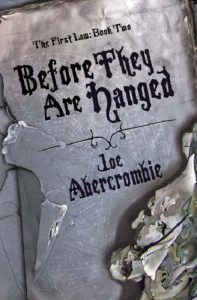
Superior Glokta has a problem. How do you defend a city surrounded by enemies and riddled with traitors, when your allies can by no means be trusted, and your predecessor vanished without a trace? It’s enough to make a torturer want to run — if he could even walk without a stick.
Northmen have spilled over the border of Angland and are spreading fire and death across the frozen country. Crown Prince Ladisla is poised to drive them back and win undying glory. There is only one problem — he commands the worst-armed, worst-trained, worst-led army in the world.
And Bayaz, the First of the Magi, is leading a party of bold adventurers on a perilous mission through the ruins of the past. The most hated woman in the South, the most feared man in the North, and the most selfish boy in the Union make a strange alliance, but a deadly one. They might even stand a chance of saving mankind from the Eaters — if they didn’t hate each other quite so much.
Ancient secrets will be uncovered. Bloody battles will be won and lost. Bitter enemies will be forgiven — but not before they are hanged.
“We should forgive our enemies, but not before they are hanged” – Heinrich Heine
My quote: “ This trilogy is a character-driven fantasy adventure that is close to unequalled in the genre. Gripping, thrilling, gritty and pretty damn awesome.”
Peter Newman – The Ruthless (Deathless #2)
THE REBEL.
For years, Vasin Sapphire has been waiting for the perfect opportunity to strike. Now, as other Deathless families come under constant assault from the monsters that roam the Wild, that time has come.
THE RUTHLESS.
In the floating castle of Rochant Sapphire, loyal subjects await the ceremony to return their rule to his rightful place. But the child raised to give up his body to Lord Rochant is no ordinary servant. Strange ad savage, he will stop at nothing to escape his gilded prison.
AND THE RETURNED…
Far below, another child yearns to see the human world. Raised by a creature of the Wild, he knows its secrets better than any other. As he enters into the struggle between the Deathless houses, he may be the key to protecting their power or destroying it completely.
THE WILD HAS BEGUN TO RISE.
My quote: “One of the most developed, unique, and thrilling fantasy series currently being written.”
Steven Erikson – Midnight Tides (Malazan: Book of the Fallen #5)
After decades of internecine warfare, the tribes of the Tiste Edur have at last united under the Warlock King of the Hiroth, There is peace–but it has been exacted at a terrible price: a pact made with a hidden power whose motives are at best suspect, at worst deadly.
To the south, the expansionist kingdom of Lether, eager to fulfill its long-prophesized renaissance as an Empire reborn, has enslaved all its less-civilized neighbors with rapacious hunger. All, that is, save one–the Tiste Edur. And it must be only a matter of time before they too fall–either beneath the suffocating weight of gold, or by slaughter at the edge of a sword. Or so destiny has decreed.
Yet as the two sides gather for a pivotal treaty neither truly wants, ancient forces are awakening. For the impending struggle between these two peoples is but a pale reflection of a far more profound, primal battle–a confrontation with the still-raw wound of an old betrayal and the craving for revenge at its seething heart.
Note: I don’t have a quote about this one as I read this before I started reviewing. 10/10. By far, by so much distance far, it’s the best book I have ever read and I don’t think I’ll ever read one better. The big reveal. Just, wow. Don’t want to Bugg anyone with it so let’s just carry on.
R.F. Kuang – The Poppy War (The Poppy War #1)
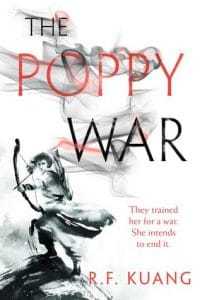
When Rin aced the Keju—the Empire-wide test to find the most talented youth to learn at the Academies—it was a shock to everyone: to the test officials, who couldn’t believe a war orphan from Rooster Province could pass without cheating; to Rin’s guardians, who believed they’d finally be able to marry her off and further their criminal enterprise; and to Rin herself, who realized she was finally free of the servitude and despair that had made up her daily existence. That she got into Sinegard—the most elite military school in Nikan—
was even more surprising.
But surprises aren’t always good.
Because being a dark-skinned peasant girl from the south is not an easy thing at Sinegard. Targeted from the outset by rival classmates for her color, poverty, and gender, Rin discovers she possesses a lethal, unearthly power—an aptitude for the nearly-mythical art of shamanism. Exploring the depths of her gift with the help of a seemingly insane teacher and psychoactive substances, Rin learns that gods long thought dead are very much alive—and that mastering control over those powers could mean more than just surviving school.
For while the Nikara Empire is at peace, the Federation of Mugen still lurks across a narrow sea. The militarily advanced Federation occupied Nikan for decades after the First Poppy War, and only barely lost the continent in the Second. And while most of the people are complacent to go about their lives, a few are aware that a Third Poppy War is just a spark away . . .
Rin’s shamanic powers may be the only way to save her people. But as she finds out more about the god that has chosen her, the vengeful Phoenix, she fears that winning the war may cost her humanity . . . and that it may already be too late.
Note:- I’ve just finished the sequel and it is arguably even better somehow, but this is the one that I’m including on my list.
My quote: “A masterpiece by grimdark’s newest and perhaps darkest daughter.”
Alexander Dan Vilhjálmsson – Shadows of the Short Days
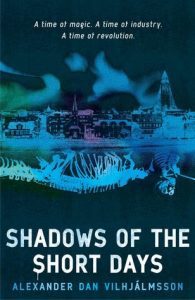 A strikingly original Icelandic debut set in a strangely familiar alternate Reykjavik where wild and industrialised magic meet.
A strikingly original Icelandic debut set in a strangely familiar alternate Reykjavik where wild and industrialised magic meet.
Perfect for fans of contemporary fantasy in the style of Lev Grossman’s The Magicians or China Mieville’s The City & The City
Sæmundur the Mad, addict and sorcerer, has been expelled from the magical university, Svartiskóli, and can no longer study galdur, an esoteric source of magic. Obsessed with proving his peers wrong, he will stop at nothing to gain absolute power and knowledge, especially of that which is long forbidden.
Garún is an outcast: half-human, half-huldufólk, her very existence is a violation of dimensional boundaries, the ultimate taboo. A militant revolutionary and graffiti artist, recklessly dismissive of the status quo, she will do anything to achieve a just society, including spark a revolution. Even if she has to do it alone.
This is a tale of revolution set in a twisted version of Reykjavik fuelled by industrialised magic and populated by humans, interdimensional exiles, otherworldly creatures, psychoactive graffiti and demonic familiars.
My quote: “A masterfully crafted dark tale . . . one of the most ambitious, intense, original and thrilling debuts I’ve read in a long time”
RJ Barker – Blood of Assassins
Girton Club-foot, apprentice to the land’s best assassin, still has much to learn about the art of taking lives. But his latest mission tasks him and his master with a far more difficult challenge: to save a life. Someone, or many someones, is trying to kill the heir to the throne, and it is up to Girton and his master to uncover the traitor and prevent the prince’s murder.
In a kingdom on the brink of civil war and a castle thick with lies Girton finds friends he never expected, responsibilities he never wanted, and a conspiracy that could destroy an entire kingdom.
My quote: “Simply unputdownable . . . the perfect mix of fantasy and mystery”
Anna Smith-Spark – The Court of Broken Knives (Empires of Dust #1)
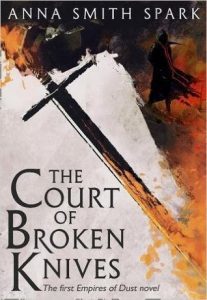 They’ve finally looked at the graveyard of our Empire with open eyes. They’re fools and madmen and like the art of war. And their children go hungry while we piss gold and jewels into the dust.
They’ve finally looked at the graveyard of our Empire with open eyes. They’re fools and madmen and like the art of war. And their children go hungry while we piss gold and jewels into the dust.
In the richest empire the world has ever known, the city of Sorlost has always stood, eternal and unconquered. But in a city of dreams governed by an imposturous Emperor, decadence has become the true ruler, and has blinded its inhabitants to their vulnerability. The empire is on the verge of invasion – and only one man can see it.
Haunted by dreams of the empire’s demise, Orhan Emmereth has decided to act. On his orders, a company of soldiers cross the desert to reach the city. Once they enter the Palace, they have one mission: kill the Emperor, then all those who remain. Only from ashes can a new empire be built.
The company is a group of good, ordinary soldiers, for whom this is a mission like any other. But the strange boy Marith who walks among them is no ordinary soldier. Marching on Sorlost, Marith thinks he is running away from the past which haunts him. But in the Golden City, his destiny awaits him – beautiful, bloody, and more terrible than anyone could have foreseen.
“Not sure I really feel like fucking someone who’s part god and part suicidal drunk, you know”
My quote: “Grimdark of the highest order with one of the most complex, beautiful and destructive characters ever written”
https://www.fantasybookreview.co.uk/Anna-Smith-Spark/The-Court-of-Broken-Knives.html
Mark Lawrence – Prince of Fools (Red Queen’s War #1)
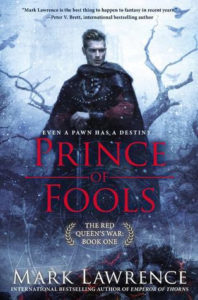 “I’m a liar and a cheat and a coward, but I will never, ever, let a friend down. Unless of course not letting them down requires honesty, fair play or bravery.”
“I’m a liar and a cheat and a coward, but I will never, ever, let a friend down. Unless of course not letting them down requires honesty, fair play or bravery.”
Note: I’ve read every single series Mark Lawrence has written and have rated all his works highly. Prince of Thorns is the natural choice to be here. However, this is my personal list and I enjoyed this series more. For new readers to Grimdark, however, Prince of Thorns is a great place to start, but you can start here too in The Broken Empire world.
My quote: “Stunning… Jalan and Snorri are one of the finest duos I have had the pleasure of reading about.”
Ed McDonald – Blackwing (The Raven’s Mark #1)
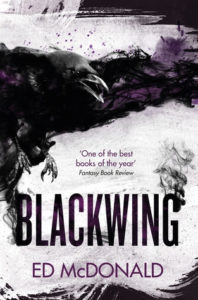 I was very lucky. I was the first reviewer to read and then review Blackwing which is probably the only reason my quote is on the cover. Ed is one of the nicest guys in fantasy and I’ve just finished Crowfall and it’s incredible.
I was very lucky. I was the first reviewer to read and then review Blackwing which is probably the only reason my quote is on the cover. Ed is one of the nicest guys in fantasy and I’ve just finished Crowfall and it’s incredible.
My quote: “9.2/10 – Guaranteed already, this will be one of the best books I will read this year. I can see Blackwing becoming a big deal in the fantasy world and I can’t wait for the next book.”
Rob J. Hayes – Where Loyalties Lie (The Best Laid Plans #1)
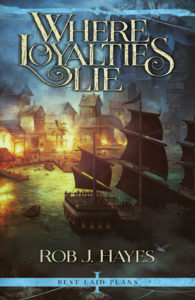 Note: The guy I put forward from my group and the eventual winner of #SPFBO. I’d say Hayes is the finest self-published Grimdark Author around. (Sorry, M.L Spencer, Rosalyn Kelly, and Ben Galley. You guys rule too!)
Note: The guy I put forward from my group and the eventual winner of #SPFBO. I’d say Hayes is the finest self-published Grimdark Author around. (Sorry, M.L Spencer, Rosalyn Kelly, and Ben Galley. You guys rule too!)
My quote: “Piratical grimdark mastery, superbly written, with utterly engaging characters”
Gareth Hanrahan – The Gutter Prayer
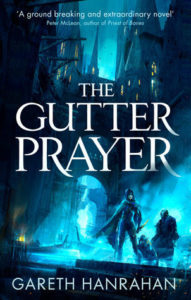 My quote: “Hanrahan’s highly anticipated fantasy debut is a real breath of fresh air . . . The Gutter Prayer features a skilfully crafted world, with masterful drama, expert dialogue, brilliant characters and an ending I did not see coming . . . A book that every fantasy fan should read”
My quote: “Hanrahan’s highly anticipated fantasy debut is a real breath of fresh air . . . The Gutter Prayer features a skilfully crafted world, with masterful drama, expert dialogue, brilliant characters and an ending I did not see coming . . . A book that every fantasy fan should read”
Dyrk Ashton – Paternus: Wrath of Gods (The Paternus Trilogy #2)
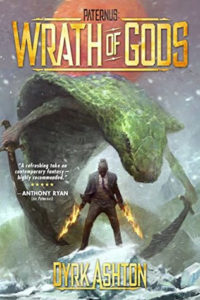 Note: There is a rumour that this book was written by Dyrk Ashton’s alter ego Micheal R. Fletcher (Grimdark royalty) but I have met Dyrk once and if it was one of Michael’s doppels it was very convincing. Either way, this is one of the most researched myth/legend/lore based dark epic urban fantasy concoctions ever written. Dyrk is a SPFBO semi-finalist with over 1000 Goodreads reviews as a self-pub author. When you have me (lol), Anthony Ryan, Nicholas Eames, Anna Stephens, MR Carey and Mark Lawrence on your covers then you aren’t doing too bad. I’m not going to link this one but I said the first book was “A dark urban fantasy gem”
Note: There is a rumour that this book was written by Dyrk Ashton’s alter ego Micheal R. Fletcher (Grimdark royalty) but I have met Dyrk once and if it was one of Michael’s doppels it was very convincing. Either way, this is one of the most researched myth/legend/lore based dark epic urban fantasy concoctions ever written. Dyrk is a SPFBO semi-finalist with over 1000 Goodreads reviews as a self-pub author. When you have me (lol), Anthony Ryan, Nicholas Eames, Anna Stephens, MR Carey and Mark Lawrence on your covers then you aren’t doing too bad. I’m not going to link this one but I said the first book was “A dark urban fantasy gem”
Peter McLean – Priest of Lies (War for the Rose Throne #2)
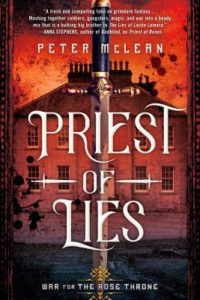 Note: As far as I can remember, I’m sure Peter can tell you otherwise if I’m wrong, I was the first reviewer to read Priest of Bones too and loved it which is why I metaphorically knocked down Ace Books door to get a copy of this. It’s even better than the first.
Note: As far as I can remember, I’m sure Peter can tell you otherwise if I’m wrong, I was the first reviewer to read Priest of Bones too and loved it which is why I metaphorically knocked down Ace Books door to get a copy of this. It’s even better than the first.
My quote: “Priest of Lies is stunning low fantasy by an author who is on top of his game.”
Anna Stephens – Godblind
 Note: One of the nicest members of the fantasy scene (unless you are scared of hammers) – I was lucky enough to attend the Godblind book launch.
Note: One of the nicest members of the fantasy scene (unless you are scared of hammers) – I was lucky enough to attend the Godblind book launch.
My quote: “A thrilling, unrelenting and a brilliantly presented debut.”



The post Grimdark top 15: James picks his favourites appeared first on Grimdark Magazine.
September 11, 2019
REVIEW: The God King’s Legacy by Richard Nell
Not so much a novel as a collection of two novellas that are only distantly related, The God King’s Legacy serves as an excellent introduction into the as yet unreleased God-King’s Chronicles series.
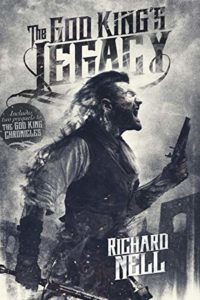 Rebellion of the Black Militia, the first novella, is about an apprentice Scribe that is being assigned to work with a legendary Knight to weed out a rebellion that seems to have a demon behind it. In this world, demons can be captured and held by magical markings on the body of the holder, with Scribes as the experts in such castings. The God-King himself has done this, and it appears that this is what keeps the demons at bay for the most part. If a Scribe or Knight holds the demon, it is neutralized and kept from hurting the population at large. A nice bonus is that the holder gains powers directly from the demon possessing him or her.
Rebellion of the Black Militia, the first novella, is about an apprentice Scribe that is being assigned to work with a legendary Knight to weed out a rebellion that seems to have a demon behind it. In this world, demons can be captured and held by magical markings on the body of the holder, with Scribes as the experts in such castings. The God-King himself has done this, and it appears that this is what keeps the demons at bay for the most part. If a Scribe or Knight holds the demon, it is neutralized and kept from hurting the population at large. A nice bonus is that the holder gains powers directly from the demon possessing him or her.
The second story, Devil of the 22nd, follows a rogue soldier that has taken control of his army that has been all but forgotten by the Emperor after years of service in the borderlands. Kurt isn’t particularly liked by his men, but they follow him because with smoke and mirrors he is able to keep them thinking that it is in their best interests to do so. Kurt has his hidden agenda though and is playing a larger game for bigger stakes.
These two stories happen on the same continent but are very far apart and set in different countries. The tone is different in each, but we see some common elements. The demon-Scribe dynamic reminds me of Peter V. Brett’s The Warded Man (or The Painted Man outside of the USA). Meanwhile, the extensive use of guns fit the flintlock sub-genre of fantasy that’s been more popular in recent years thanks to the likes of Brian McClellan and Django Wexler. Combine these with the dark grit of Mark Lawrence’s Broken Empire and you get a good feel of what to expect. Perhaps…
These stories are both self-contained and satisfying on their own but give us an excellent teaser to what might be coming when Nell releases his longer works set in this world. He takes elements we might have seen in different places and blends them together in a unique presentation which fully engages the reader and drops the occasional surprise or WTF moment here and there.
When the longer story is out there, I’ll be looking into it with anticipation.
Oh, and that cover by Shawn King just screams “take my money!”
Check out an excerpt of The God King’s Legacy.
Buy The God King’s Legacy
The post REVIEW: The God King’s Legacy by Richard Nell appeared first on Grimdark Magazine.
September 9, 2019
EXCERPT: Chains of Blood By ML Spencer
Chains of Blood by ML Spencer is the first book in The Chaos Cycle, a standalone series set in the same world as The Rhenwars Saga. Chains of Blood features a new generation of heroes and demons charged with defending the Rhen against an ancient collective society. New readers will enjoy the depth of the world without feeling lost within it, while fans of the original saga will appreciate the familiar setting.
In Chains of Blood, Rylan Marshall discovers his entire life has been a lie. Recipient of a legacy he never knew existed, Rylan is attacked, his young daughter taken from him. His assailant leaves him with two gifts: the gift of magic and an unbreakable oath to Chaos. Rylan blames himself, even though he knows it wasn’t his fault. The life he knew was over, and war is coming. A new enemy, stronger and more cunning than any his people have ever faced, threatens his already war-torn homeland. Will Rylan use his newfound power to make a stand? Or will his oath to darkness turn him into an adversary?
Below, check out the first chapter of this hotly anticipated book by ML Spencer. Make sure to add it to your Goodreads list!
Chapter One
Gift of Darkness
The inn’s door blew open with a shriek.
Rylan Marshall flinched at the noise, his hand moving to the hilt of the sword resting at his side against the table. One of the inn’s customers bolted up, trudged across the room, and slammed the door shut. Rylan’s fingers loosened on the hilt, eventually retracting. The tension that gripped his shoulders took longer to go away.
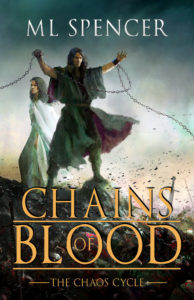 Seated across the table, his father offered a sympathetic smile. “Can always tell when a man’s served time at the front. The nerves get stretched, like catgut. It took me four years before I stopped jumping at every barking dog.” He drained his whiskey and let out a slow sigh. “Some men never lose it…” He set the spent cup down on the table, then scratched his head. His auburn hair was cropped shorter than he usually liked to wear it, peppered with far more grays than Rylan remembered.
Seated across the table, his father offered a sympathetic smile. “Can always tell when a man’s served time at the front. The nerves get stretched, like catgut. It took me four years before I stopped jumping at every barking dog.” He drained his whiskey and let out a slow sigh. “Some men never lose it…” He set the spent cup down on the table, then scratched his head. His auburn hair was cropped shorter than he usually liked to wear it, peppered with far more grays than Rylan remembered.
“I’m just glad to be home,” Rylan said with a sad smile. He raised his cup to his lips and drained the last of his whiskey.
Outside, the wind gave a ghoulish moan.
He poured himself what was left of the bottle and tossed it back in one swallow, setting the cup down harder than he’d intended. He ran a hand through his thick black hair, then cast a sideways glance at his father. “You should have seen what they did to their own vanguard at Edden’s Ford. We had them trapped against the water, so they turned their weapons on their own men. They forded the river on a bridge of corpses. Walked right over them.”
His father shook his head. “Desperate men do desperate things,” he muttered. For a moment, his eyes grew haunted. He stared down into the shadows of his cup, absently sliding a fingernail along the rough grain of the table’s surface. The air moving in under the door fanned the table lantern, bringing Clemet’s mind back from whatever hell it had wandered into. He took a measured sip from his cup, then signaled the inn’s proprietor for another bottle.
Rylan raised his hands in defeat. “No more for me,” he said, then pushed his chair back. “I’ve got to be heading back. Korey’ll be up waiting for me, and we’ve got an early day tomorrow. I’ve decided to take him into Auberdale. Get him a good pair of shoes,” he added with a smile. “The ones he’s got have holes in them.”
“While you’re there, get yourself a pair,” his father said, gesturing down at Rylan’s worn boots, which had seen many miles and many battles. He dug a small handful of coins out of his pocket and slid them across the table. Rylan opened his mouth to protest, but Clemet cut him off before he could get the words out.
“Go on, now,” he insisted, waving him away. “I’ve still got another round left in me. I’ll walk you out, though.”
“My thanks,” Rylan managed, knowing that arguing wouldn’t get him anywhere. He pocketed the coins then stood up, taking a moment to stretch his legs and gird his sword belt. The Farlow Inn hummed with the sounds of subdued conversations. Only a few patrons were gathered in the common room, all locals. A haze of pipe smoke fogged the air, the aroma combining pleasantly with woodsmoke coming from a river-rock hearth on the far wall. Rylan pulled on his coat and followed his father out the door.
The smell of the hearth trailed after them into the night. Outside, Clemet embraced him and clapped him on the shoulder.
“It’s good to have you home, son,” he said with a sincere smile. “Tell your mother I’ll be along in a bit.” He gave him another squeeze, then turned and walked back into the inn.
Obscured by clouds, the moon was reduced to a thin yellow haze that shed an anemic light over the town. Rylan thrust his hands into his pockets and strolled with his head bowed, enjoying the warmth of the liquor in his belly. The dust-paved streets of Farlow were quiet, almost ghostly in their stillness. Not a soul was about.
A building across the street gave a sharp crack. “Settling,” as his mother would call it. The noise startled him. At the front, he’d learned not to trust sounds he didn’t expect. He glared at the house, resenting it, and forced his hands back into his pockets. He walked on down the street, his right hand fingering the coins his father had given him. Another gust of wind came up, ruffling his hair.
Up ahead, a shadow crossed his path and disappeared down a side street. Human-shaped. At least, he thought it looked human. It could have been anything. Something about it tugged at the hairs on the back of his neck. Rylan paused and brought a hand up, scratching the week-old growth of whiskers on his face. He shrugged off the feeling and walked on.
He left town on a narrow, gravelly path leading through acres of cornfields toward his own homestead. Tall stalks rose around him, walling the path to either side, swaying back and forth between gusts of wind. Overhead, the moon dodged in and out of the clouds, the path ahead alternating between silver and shadow.
A scratching noise like metal against metal came from the field to his right.
Rylan stopped, frowning, and turned in the direction of the sound. He could make out an opening in the rows of corn, as though someone had left the trail and carved a path through the stalks. He started toward the opening, then stopped himself. Whoever was out there, it wasn’t his business. He had a family to get home to. He turned and continued on.
The cornfield ended with a long row of sycamores, a windbreak that wasn’t doing much of a job. On the other side, Rylan could make out the lights of his parents’ farmhouse glowing warmly through a lacy silhouette of leaves. His mother was still awake.
The scratching noise came again.
Rylan whirled toward it.
Behind him was another human-like shadow, only this time standing in the center of the path.
It was gone as soon as he saw it.
Rylan blinked. His stomach tightened, and his brow broke out in a sweat. A feeling came over him in an icy wave—one he recognized. It was the same feeling he got when staring across a battlefield at enemy lines.
“Who’s there?” he called into the darkness, taking a step forward.
Nothing.
A rush of wind trilled the leaves of the sycamores.
Whoever it was, he didn’t want them near his home. Hand on his hilt, he started back toward the cornfield. The night grew alarmingly quiet. The sounds of his boots crunching on gravel rang much louder than they should, echoing through the darkness in the absence of other noise. The wind had stopped. The limbs of the trees swayed to a standstill.
Rylan walked back out into the field, the moon casting his shadow ahead of him. His eyes scanned the path to either side, seeing only tall walls of cornstalks. Until he came to the opening in the rows. He stopped, considering the trail. A stale breeze wafted past him, carrying a rank odor. Rylan drew in a deep breath, gathered his courage, then walked into the corn.
Following a dark and narrow path, he had to fight with the rough stalks, pushing them out of his way as they raked his skin. Part of him didn’t want to keep going. But another part of him did. From ahead came the scratching sound again, louder this time. It scraped like a dull knife down his nerves. He pushed aside the last row of stalks.
Another shadow streaked across his vision.
It lunged for him.
Rylan’s reaction was primal and automatic. He bared his sword and swept it around in a two-handed arc. The blade parted the shadow without connecting with anything.
Startled, Rylan took a jolting step back. The shadow swept forward, reaching out for him. He spun back around—
—and cried out, stumbling away from the face of a man standing only inches from him. His fingers opened on their own, and the sword fell from his grip.
The man reached out and caught his arm. Rylan stood frozen, the fear in his gut a paralyzing venom. The hand tugged at his arm, and he walked woodenly forward, his feet moving of their own accord. The shadowy man led him back into the ring of trampled cornstalks.
Rylan’s eyes went to the remains of a good-size fire that had been built in the center of the circle. He recognized the smell now: burnt human flesh. He’d smelled that stench before on the battlefield. His gaze was glued to the pile, unable to look away. Before him, the blackened flesh took on definition. Thin arms, twisted legs, distorted face. Small, like a child.
He flinched away, his gaze settling on a small leather shoe with a hole in the toe.
Rylan collapsed to his knees, throttled by horror. A soul-wrenching cry welled up from his depths, twisting his guts.
His assailant stepped forward out of the shadows. The man had a gray and angular face. His piercing eyes bored into him through a mat of long, oily hair. He reached out his hand, as if offering to help him to his feet.
Rylan dodged past him and scrambled toward the charred remains of his boy. But the gray-skin man sprang in front of him, cutting him off. Rylan sank to his knees, all his strength pouring out of him in a flood.
“Why?” was all he could get out.
“Because it is your fate.”
The words were meaningless. None of this was happening. He must have been asleep. Dreaming. More human-like shades slid forward to encircle him. Rylan’s stomach heaved, and he vomited. He sank back, drawing his legs up to his chest and smothering his face with his hands. His cheeks ran with tears, his body wracked by sobs.
“Why?” he moaned again.
“Because of who you are.”
He looked up at the man through thick layers of incomprehension. “Who I am…?” He shook his head. “I’m nobody…”
This wasn’t real. This wasn’t happening.
The thin lips drew back in a smile, baring teeth. The gray man knelt before him, staring into his eyes. “We bring you a great gift, Gerald. Think of it as your inheritance.”
Rylan’s thoughts lurched. His brain jammed like stuck gears. “Who’s Gerald…?”
They had the wrong man, the wrong family. This was all a mistake.
But his boy lay smoldering in front of him, and the devil-bastard who’d killed him wasn’t going away.
Rylan’s anger exploded, wrenching fear aside. He struck out with a fist and hit a wall of solid air. The bones snapped in his hand. He opened his mouth to scream, but something slammed him to the ground, knocking the air from his lungs. The gray-faced man stalked toward him, his face frozen in a look of intense calm.
Gasping, Rylan rolled over and pushed himself to his feet. He backed away from the man, circling the edge of the clearing. His assailant pursued him, maintaining his distance, his flat expression never faltering.
Rylan sprang for his sword. His hand closed on the hilt, and he brought the blade up.
The weapon dislodged itself from his grip and flew back at him, the pommel driving hard into his temple. Dazed, Rylan staggered.
Something knocked him off his feet and hurled him to the ground. Rylan lay there, blinking slowly, as the demon-man came to stand over him. Gritting his teeth, Rylan forced himself to move, pushing himself to his hands and knees. A foot shot out, taking him in the ribs. Another kick knocked him back to the ground. Rylan glared wrathfully up into the man’s stone-calm face.
“You son of a whore!” he rasped. Spitting a mouthful of blood, he pushed himself upright.
The gray-faced man knelt in front of him, staring into his eyes with an infinite glare.
Rylan brought his hand up to throw a punch at the man’s windpipe. The gray man moved with the speed of a snake strike. He caught Rylan’s fist and gripped it hard. Then something struck him, and he gave a grunt.
Rylan felt a stirring in his fingers. A strange power flowed into him from his assailant’s body, moving through his hand, washing up his arm, flooding into him. It swept through him, engorging him, awakening every fiber of his being with an exhilaration that transcended anything he’d ever known. The energy swelled, rapturous, until the ecstasy became unbearable.
Rylan screamed.
The flood of energy ceased.
He collapsed, falling face-first onto the trampled cornstalks. He lay there for several minutes, twitching and gasping. When he could finally open his eyes, he saw the gray-faced man lying dead beside him. With a cry, Rylan jerked back.
Another man appeared, taller than the first, stepping into the circle through the ring of shadows. This man wasn’t gray. He had olive skin and a hawk-like nose. He wore his long brown hair pulled back from his face. The man stooped in front of Rylan and peered at him. The shadows in his eyes were endless and harrowing.
“You will repeat after me,” he said calmly. “I commit my soul to Chaos.”
Rylan gaped up at him, shaking his head. “No.”
The man leaned closer. “Yes. Or I swear by Xerys, your daughter will meet an excruciating end.”
Amina…
Rylan shook his head, unable to draw breath through his horror.
The man’s eyes narrowed. “Say it!”
Not Amina too. Not my baby girl…
Trembling, he whispered, “I commit my soul to Chaos…”
“From this day forth, I will be the obedient servant of Xerys.”
Rylan stared at his son’s charred body, trembling in revulsion. He shook so hard it was difficult to get the words out. “From this day forth, I will be the obedient servant of Xerys…”
“And may not even death release me.”
“No…” Rylan wheezed.
“Say it!” the man hissed.
Rylan sucked in a long, shuddering breath, then whispered, “And may not even death release me…oh, gods. Please help me…”
“Only one god can help you now,” the man assured him, straightening.
Rylan collapsed, wracked in sobs.
Behind him, he heard footsteps walking away. “I’m taking your daughter back with me,” the man informed him. “Someday I will call, Gerald. And you will come.”
The man-like shadows swirled away into darkness. The olive-skinned man disappeared with them.
Check out more ML Spencer action!
Five female authors smashing grimdark right now
The post EXCERPT: Chains of Blood By ML Spencer appeared first on Grimdark Magazine.
REVIEW: Wraith Knight by CT Phipps
Wraith Knight, by C.T. Phipps, asks a Tolkien-inspired what-if: After Sauron fell, what would an out-of-work Nazgul do with the rest of its eternal lifespan? In this book, readers follow Jacob Riverson, an undead warrior in similar straits coping with his recent emancipation and newfound free will after the downfall of his own dark lord, the King Below.
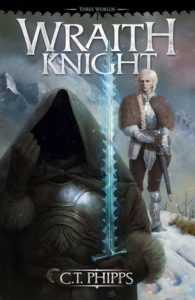 Wraith Knight is a tale told in first person, narrated by Jacob himself. On the whole, I found him well suited to the task with an enjoyable narrative voice, a dark sense of humor, and a refreshingly pragmatic outlook in dealing with his friends and enemies. His death and necromantic resurrection leave him with a 252-year gap in his memory—but this is helpful from the reader’s perspective, as Jacob’s ignorance of a changed world allows us to smoothly learn about the state of things along with him.
Wraith Knight is a tale told in first person, narrated by Jacob himself. On the whole, I found him well suited to the task with an enjoyable narrative voice, a dark sense of humor, and a refreshingly pragmatic outlook in dealing with his friends and enemies. His death and necromantic resurrection leave him with a 252-year gap in his memory—but this is helpful from the reader’s perspective, as Jacob’s ignorance of a changed world allows us to smoothly learn about the state of things along with him.
After his awakening, Jacob soon finds purpose and a righteous use for his dark powers in two secondary protagonists: Regina and Serah. Regina, an elfblooded warrior with a strong sense of justice, is on a crusade against the Empress and so-called Nine Heroes who murdered her family. Serah, by contrast, is a gifted witch with a talent for the darker side of magic and a significantly more cunning outlook on life. Together, the pair act as interesting (and often humorous) character foils to one another and form a sort of angel-and-devil dynamic. Other standout characters include the charismatic voice of the King Below’s lingering essence, ever tempting Jacob to take up his old mantle as the god of evil, and Creature, a former priest of the dark lord reluctantly drawn into Jacob’s service.
The world Jacob and his companions inhabit is less grimdark in the low-fantasy Abercrombie tradition and more grimdark in the vein of Warhammer Fantasy, with spiked leather gauntlets, a host of fantastical races and beasts, and countless soldiers ground to mincemeat by battlefield sorcery. Spellcasters make use of a wide range of magics (light, dark, noon, twilight, blood, true-name, etc.), and the killing fields are littered with enchanted swords and sorcerous engines of war. At times, the setting feels a little overstuffed with so many fantasy elements, but Phipps does some neat subversions of traditional genre tropes (the idea of certain races and types of magic as purely good or evil, for example) that keep things fresh. If the author ever translates this series into a tabletop RPG, I’d be the first to buy a copy.
In terms of plot and pacing, Phipps keeps things moving at a timely clip. While the events of the novel sometimes feel like a series of boss fights, increasingly epic action and a few solid (and genuinely surprising) plot twists keep the pages turning. Readers will also appreciate a few well-placed nerd jokes (like references to Sir Terry Pratchet).
While I found a lot to enjoy in this book, Wraith Knight also had a few elements that didn’t work as well for me. One among these was the staggering power level of Jacob and friends. Between the skills he learned in life as a knight and the secrets he gained in undeath, Jacob is an expert swordsman, powerful necromancer, and master blacksmith capable of crafting magical wonders. Regina is even better with a blade, and Serah’s shadow magic is capable of laying waste to scores of soldiers. With a plot that relies so heavily on action, the borderline godlike strength of the trio paired with a loosely defined magic system sometimes made it difficult to build suspense or tension. This, combined with dialog and behavior that didn’t always feel natural made it hard to connect to the characters at times.
Issues aside, this book was still an action-packed page-turner with a unique premise and a solid narrative voice. Fans of similar content in Tolkien, the Overlord anime/manga, or the LitRPG genre (although this novel leans more toward dark fantasy) should give Wraith Knight a read. I would give this one a strong 3.5/5 stars. While one doesn’t simply walk into Mordor, the Kindle store is only a click away.
Buy Wraith Knight
The post REVIEW: Wraith Knight by CT Phipps appeared first on Grimdark Magazine.
September 7, 2019
REVIEW: The Buried Dagger by James Swallow
After well over a hundred novels, novellas, short stories, and audio installments, The Buried Dagger brings the Black Library’s flagship series, The Horus Heresy, to a close…of sorts. Yes, there is no way that a review of the final book in the HH would be complete without some commentary on the state of the series in general, and the fact that this last book is by no means the ‘end’. As we all now, a few months ago, BL announced that a new series would be introduced to cover the climactic battle for the very salvation of the Imperium–The Siege of Terra. Siege of Terra was proclaimed to be a lean and mean, focused 8 book series dedicated to telling the story that the HH should have told, had it not been subjected to sprawl and bloat. Of course, it has also already been announced that the core Siege of Terra novels will be ‘enriched’ by a slew of ancillary novellas; with, I’m sure, more short stories and audiobooks in the works as well.
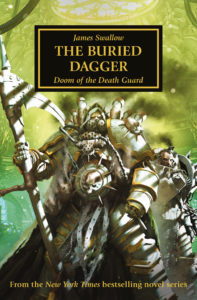 One of the points to all this is that, no matter what, The Buried Dagger is predestined to suffer somewhat simply due to the fact that it is such an odd choice of subject matter–being a chronicle of Mortarion’s embracing of Nurgle’s ‘Gift’–to ‘close’ the series out with. It seems to me that the HH should begin and end with the traitor named in the title; ergo, it should not end until we see the traitor Warmaster dead at the mortally wounded Emperor’s feet. It also reminds us what happens when what should have been a focused series becomes the very antithesis of such. We’ve seen author(s) stating that the sprawl was a good thing–allowing us to view the multitudinous parallel storylines transpiring during the HH–and, while this is true in theory, would not the wisest choice have been to simply create a Warhammer 30,000 novel line from the get-go, so we might see those stories, while allowing the Heresy to stay on track? I believe so; but I am also acutely aware of the brand value associated with the Horus Heresy name. Yes, one can never avoid the business side of business.
One of the points to all this is that, no matter what, The Buried Dagger is predestined to suffer somewhat simply due to the fact that it is such an odd choice of subject matter–being a chronicle of Mortarion’s embracing of Nurgle’s ‘Gift’–to ‘close’ the series out with. It seems to me that the HH should begin and end with the traitor named in the title; ergo, it should not end until we see the traitor Warmaster dead at the mortally wounded Emperor’s feet. It also reminds us what happens when what should have been a focused series becomes the very antithesis of such. We’ve seen author(s) stating that the sprawl was a good thing–allowing us to view the multitudinous parallel storylines transpiring during the HH–and, while this is true in theory, would not the wisest choice have been to simply create a Warhammer 30,000 novel line from the get-go, so we might see those stories, while allowing the Heresy to stay on track? I believe so; but I am also acutely aware of the brand value associated with the Horus Heresy name. Yes, one can never avoid the business side of business.
With that rant, I mean observation out of the way, it’s time to get to the review of The Buried Dagger. Just to mention, before getting into it, I have not read every Horus Heresy book or story, so I’m sure some of the Easter Eggs may have flown over my head. The short take of this book is that it is very well done; I am aware that many in the fanbase have, ah, varying opinions on James Swallow. I’ve always enjoyed his writing style, and think he’s in fine form here; although, of course, there’s some issues throughout. Let’s take a look at the blurb, and then the book itself.
For long years, the Horus Heresy has ground on. Now, the Death Guard have been sent to begin the final battle. But Mortarion and his sons must face their gravest challenge first – for Nurgle has claimed them as his own, and he will not be denied…
The skies darken over Terra as the final battle for the Throne looms ever closer… As the Traitor primarchs muster to the Warmaster’s banner, it is Mortarion who is sent ahead as the vanguard of the Traitor forces. But as he and his warriors make way, they become lost in the warp and stricken by a terrible plague. Once thought of as unbreakable, the legendary Death Guard are brought to their knees. To save his Legion, Mortarion must strike a most terrible bargain that will damn his sons for eternity. Meanwhile, in the cloisters of Holy Terra, a plot is afoot to create sedition and carnage in advance of Horus’s armies. Taking matters into his own hands, Malcador the Sigillite seeks to put a stop to any insurrection but discovers a plot that he will need all of his cunning and battle-craft to overcome.
We can break The Buried Dagger down into two core storylines: Mortarion’s story, and what’s happening on Terra, in these final days before the armadas of the Warmaster arrive. Examining Mortarion’s tale, which is the core arc of The Buried Dagger, we see that it is woven of two elements: the immeasurable amount of time Mortarion and the Death Guard spend in the limbo of the Warp, and the chronicle of the young Reaper of Men on his adopted homeworld Babarus.
The story opens with the brutally efficient cleansing of a random planet by the Death Guard, upon orders from the Warmaster. At the resolution, Mortarion is given his marching orders to lead the attack on the Palace at Terra. After a fated rendezvous with Typhon, his first Captain and longtime friend, the ships of the Death Guard enter the Warp…and remain.
Meanwhile, on Terra, Malcador and Dorn make their last minute defensive preparations; preparing the planet for the onslaught to come. However, into this hectic schedule, a mystery had arisen, which takes the efforts of the Sigillite’s dedicated Knights-Errant to solve. The discovery of numerous fallen Sisters of Silence; found in states of distress, babbling incoherently in violation of their vows. Further confounding matters, all of these lost Sisters have long been recorded as dead. The race to unravel the mystery runs Nathaniel Garro and the rest of the Knights afoul of the Ruinous Powers of Chaos at every turn. This gives the reader a good perspective of the pervasive state of unrest already palpable on Terra…well before the arrival of Horus’ ships.
So, do these three storylines (Mortarion then, Mortarion now, and the Terra arc) come together in a satisfying confluence? At the risk of sounding terribly ambiguous, I’d say yes…and no. While each aspect is well-written, the blending of them is not so seamless, leading to an experience more akin to having two novellas and a short story jammed together.
Mortarion Then
Possibly the best arc of the book, Swallow paints a sympathetic portrait of the sullen young Reaper. We see the blighted, brutal world of Barbarus, the cruel, twisted Overlords who rule over it; and, in the midst of this perennial misery, the foundling Mortarion, who is little more than a killing tool, earning the endless derision of his Overlord stepfather.
A chance meeting with a clever halfbreed (half Overlord, half “lesser”, or human) youth named Calas Typhon sets the Reaper on a new moral trajectory–instead of being an unappreciated tool, he would set to map his own destiny. This leads the young Mortarion to become a leader of men, a leader of armies, and finally, it delivers him to the two hated paternal entities in his life.
In my opinion, one of Swallow’s greatest strengths is his worldbuilding, and he is in top form here. The Barbarus he crafts is thoroughly bleak and literally toxic; permeated throughout with cruelty, utterly bereft of love and kindness.
The action scenes throughout are well done as well; showing the young Reaper honing his killing craft, allowing the reader to see him first pick up his signature weapon; the scythe, with which he harvests lives wholesale.
The scenes with Calas Typhon are done well; allowing us to see the calculating youth who, under the guise of friendship, has been leading Mortarion down the road to Damnation from the moment their paths first crossed.
Perhaps the only fault one could find with this segment of The Buried Dagger would be in some stilted dialogue; and that’s an issue that runs throughout the entirety of the novel. Nothing dreadful, but it’s not the greatest.
However, an issue (but not necessarily a problem) that presents itself is this–the chronicle of Mortarion’s youth is arguably the longest thread in The Buried Dagger. We are yet to see the Mortarion Primarch novella; it seems to me that the existence of this portion of the book will make that novella redundant. Plus, it remains to be seen as to whether the author of that book will be able to match the quality of the chronicle presented in The Buried Dagger.
Events on Terra
Well, a lot of your enjoyment of this arc is contingent on your feelings for Swallow’s pet character, Nathaniel Garro (and I’ve seen quite different opinions across the board on him). The entire subplot involving the ‘found’ Sisters was quite compelling, and tied deftly into a larger plot involving the hand of Horus himself.
Again, world-building here is a highlight. There are some dynamic setpieces upon which the action takes place; and copious amounts of blood are spilled. Of note is a segment which unfolds against the backdrop of a tropical graveyard of ships (the seafaring type, not the space variety). With toxic flies humming Nurgle’s dark message under a morbid canopy of dangling corpses, it sets a truly grim stage for the action.
The scenes on Terra are also extremely action-heavy. Swallow is a capable writer of action; although neither as dynamic nor flamboyant of some of the other BL authors. While these scenes excite, I can’t help but think some of the hack and slash word count might have been better utilized on describing some of the more advanced defenses and countermeasures which Dorn was overseeing.
Also, the Terra scenes allow us to witness the ‘next step’ for the Knights-Errant; something which long-time fans have been waiting for. While we all know what was coming, there was a twist or two which did surprise me here.
Mortarion Now
Honestly, what should have been the best section, the glorious payoff, was a bit of a letdown. There just wasn’t enough here; and what there was, it lacked in conveying the true stakes, and sense of loss.
Being adrift in the Warp should have served as prime, fertile ground for atmospheric scene-building. Seriously, of all the Chaos gods in the Warhammer mythos, Nurgle has to be the most fun to write about. An author has carte blanche to slather every page, every paragraph, with foetid rot, pus, sickly-sweet corpse aromas, and ever-present buzzing insects. Now, we do get this, but to a degree. There should have been much, much more. Where Mortarion finds himself, his entire Legion decaying around him; some by choice, some against their will, while agonizing over the decision to forfeit his very soul, this was Ground Zero for Grandfather Nurgle. Each page should have been an uncomfortable, stomach-churning experience for the reader; soaked in foulness, drowned in the inherently wrong. The horror of the surroundings should have been trumped only by the horror of what Mortarion was wagering, what he was compelled to place on the line. What he had been flirting with in the dark hours, what thoughts he had entertained as they danced maniacally in the periphery.
Instead of Mortarion being coaxed by Nurgle, instead of this utter pragmatist weighing the pros and cons, we simply get Typhon’s rebirth, some more action scenes, and the acceptance of the Gift as a foregone conclusion. Yes, there are some effective, genuinely scary moments; but the horror should have been pervasive throughout. So, what should have been the thesis of the book comes off as a bit of a rushed afterthought.
Final Thoughts
Again, in The Buried Dagger, three ‘independent’, well-written stories did not necessarily come together to form a singular, effective narrative. Many scenes, while enjoyable, could have been truncated, or altogether eliminated, to add to key areas which were lacking. While I won’t say that the novel feels rushed; I will say that there is definite padding taking place, stretching out scenes with flashbacks within flashbacks; interspersing overlong action scenes where more pertinent action is required.
I guess, in the end, for a warrior of Mortarion’s magnitude, I expected a greater war within for the sake of his very soul. Instead, it all came down to taking a handout from grandpa to help kill your absentee father because you’re pissed he offed your abusive stepfather before you could.
In closing, The Buried Dagger is a good book, and a fine episodic installment in The Horus Heresy. As a ‘close’ for the HH; well we’ve already established that it’s getting a re-name rather than a ‘close’ for the time being. So, while The Buried Dagger is a good book on its own, it will forever remain a mystery why Black Library chose to end their cash cow at this narrative juncture.
Buy The Buried Dagger
The post REVIEW: The Buried Dagger by James Swallow appeared first on Grimdark Magazine.
September 6, 2019
REVIEW: The House of Sacrifice by Anna Smith Spark
Anna Smith Spark’s The House of Sacrifice is one of the most emotionally tolling pieces of fiction I’ve ever read. It completes Empires of Dust, one of the best fantasy trilogies in recent memory. I’m equal parts shattered and satisfied. I want a hug. Or a whiskey. Or something. Anything.
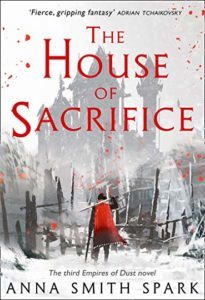 The House of Sacrifice wraps up the downright bloody tragic stories of Marith and Thalia, Orhan and Bil and Darath, and Landra and Tobias. We follow the army of Amrath as it smears blood and death and destruction across the land, unstoppable in their march to conquer the world for their god king. Marith is as self destructive and tragic as ever, Thalia is torn between having enough of her addict and the deeply-rooted love she has for just about the worst bloke on earth, and the rest of the cast are either in the way or riding the coattails of the army of Amrath.
The House of Sacrifice wraps up the downright bloody tragic stories of Marith and Thalia, Orhan and Bil and Darath, and Landra and Tobias. We follow the army of Amrath as it smears blood and death and destruction across the land, unstoppable in their march to conquer the world for their god king. Marith is as self destructive and tragic as ever, Thalia is torn between having enough of her addict and the deeply-rooted love she has for just about the worst bloke on earth, and the rest of the cast are either in the way or riding the coattails of the army of Amrath.
Now, let’s get into the best part of Anna’s books: her magnificent characters.
In the brief calm before the storm that is Anna’s writing, we are gifted a brief insight into Thalia’s mind—her questions on why she shouldn’t be happy. Why should she murder Marith for the greater good, when he is the person who makes her happy? Why should she break herself and her happiness to murder the god of death when most won’t even give a copper to a beggar? Why is hers the greater evil?
And just like that, we are thrust back into the butchery, the almost mythological descriptions of Marith as he bleeds the world. The break-neck speed storytelling that somehow manages to be both so beautiful in prose and visceral in its depiction of the land is just magnificent—easily the most unique voice in fantasy at the moment.
Marith’s fear and want for his incoming child is amazing and sickening and terrifying to behold. And his wrestle between his impending fatherhood and the needs of an insatiable army who won’t be dismissed is massive—a roller coaster he one second can’t find a way to get off, and the next second wants to go faster.
And amongst all this, there is a traitor in his ranks, maybe in his inner circle…
Our man Tobias is still with the camp followers of the army of Amrath. Still dirty on himself for not killing Marith when he had the chance to stop this wave of bloodshed before it grew into a tsunami. His inner monologues provide a refreshing bit of humour away from the unbelievable level of grit and horror in this book, and his character development is a thoroughly enjoyable part of the book. (I may have been fist pumping as he comes into his own at then end…)
Landra wanders in the wake of the army of Amrath, watching beauty spring up in the wake of devastation, seeing ruins of once populous cities, almost like a spiritual pilgrimage—or investigation—into the godhood of Marith. Trying to find a crack she can expose, somewhere to drive a killing blade into Marith. Vengeance is what she seeks, at any cost.
Orhan has spent four years in poverty. Servants gone. Wealth gone. Titles gone. All he has left is his wife Bil, who he cannot love, his lover Darath whose spirit clings by the slightest sliver of strength (or desperation), and his son, who isn’t his son, and the ongoing lamentation of all that he has lost. Once the nithique and second most powerful man in all of Sorlost, he is now but a forlorn shadow wandering in a city where all his greatest fears have come true but perhaps aren’t as bad as he feared when he fell from favour.
Smith Spark continues to paint such beautiful and vivid scenes–it’s like watching music. The opening 20% is an absolute fever dream experience with all the above twisting into an experience like no other series in fantasy. Her pace builds and builds throughout and the last hundred pages disappear like you ripped them from the spine and threw them into the wind. It’s visceral and engulfing and I honestly need a mental break after it. Holy shit.
I cannot recommend this series enough. Pick up it. Love it; don’t love it; just experience it.
If you haven’t started the series, check out The Court of Broken Knives, and The Tower of Living and Dying.
Buy The House of Sacrifice
The post REVIEW: The House of Sacrifice by Anna Smith Spark appeared first on Grimdark Magazine.

